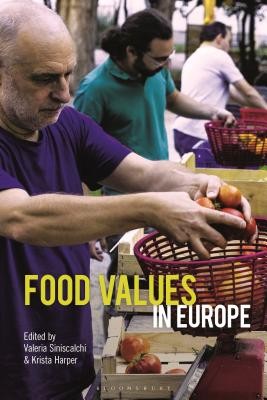
- We will send in 10–14 business days.
- Publisher: CONTINNUUM 3PL
- ISBN-10: 1350084778
- ISBN-13: 9781350084773
- Format: 16 x 23.6 x 2 cm, hardcover
- Language: English
- SAVE -10% with code: EXTRA
Food Values in Europe (e-book) (used book) | bookbook.eu
Reviews
Description
What can a focus on approaches to food practices in Europe tell us about the communities and cultures that exist there? Krista Harper and Valeria Siniscalchi show how food becomes a marker of identity and resistance to social exclusion, and food values become tools for transforming power dynamics, in a range of European countries. Through the comparison of local food, food justice and other food-centred movements across Europe, the book explains how these forms of mobilization express ideologies as well as economic and political objectives.
The chapters use ethnographic detail to focus on the differences between "new" and "old" values carried by individuals and groups in relation to food in Portugal, Greece, Latvia, Moldova, Denmark, the UK, Italy and France. Contributors analyze food values, as expressed in daily life and livelihoods, through specific practices of production, exchange and consumption. Topics covered include Prague's urban agricultural scene, the perception of poverty in Moldova, and organic food cooperatives in Catalonia.
EXTRA 10 % discount with code: EXTRA
The promotion ends in 18d.22:38:40
The discount code is valid when purchasing from 10 €. Discounts do not stack.
- Publisher: CONTINNUUM 3PL
- ISBN-10: 1350084778
- ISBN-13: 9781350084773
- Format: 16 x 23.6 x 2 cm, hardcover
- Language: English English
What can a focus on approaches to food practices in Europe tell us about the communities and cultures that exist there? Krista Harper and Valeria Siniscalchi show how food becomes a marker of identity and resistance to social exclusion, and food values become tools for transforming power dynamics, in a range of European countries. Through the comparison of local food, food justice and other food-centred movements across Europe, the book explains how these forms of mobilization express ideologies as well as economic and political objectives.
The chapters use ethnographic detail to focus on the differences between "new" and "old" values carried by individuals and groups in relation to food in Portugal, Greece, Latvia, Moldova, Denmark, the UK, Italy and France. Contributors analyze food values, as expressed in daily life and livelihoods, through specific practices of production, exchange and consumption. Topics covered include Prague's urban agricultural scene, the perception of poverty in Moldova, and organic food cooperatives in Catalonia.


Reviews